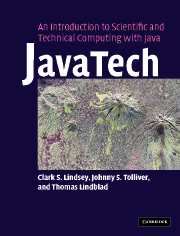Preface
Published online by Cambridge University Press: 08 January 2010
Summary
Java is a serious language suitable for demanding applications in science and engineering. Really, we promise! Java offers a lot more than just those little applets in your Web browser.
In JavaTech we focus on how Java can perform useful tasks in technical computing. These tasks might involve an animated simulation to demonstrate a scientific principle, a graphical user interface for an existing C or C++ computational engine, a distributed computing project, controlling and monitoring an experiment remotely via the Internet, or programming an embedded Java hardware processor in a device such as a remote sensor. While other Java books intended for the science and engineering audience concentrate primarily on numerical programming, we take a much broader approach and examine ways that Java can benefit programmers working on many different types of technical applications.
This project grew out of a course given by two of us (C.S.L. and Th.L.) at the Royal Institute of Technology in Stockholm, Sweden in which students of diverse backgrounds followed the class via the Internet. For this type of distance learning situation, we developed hypertext instructional material for delivery via the Web browser that allows for a high degree of self-study. This approach works especially well with Java since many of the demonstration programs run as applets within the browser.
This book provides a handy print companion to this hypertext course, which is available online at www.javatechbook.com.
- Type
- Chapter
- Information
- JavaTech, an Introduction to Scientific and Technical Computing with Java , pp. xiii - xviiiPublisher: Cambridge University PressPrint publication year: 2005



